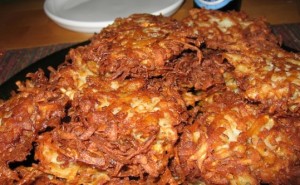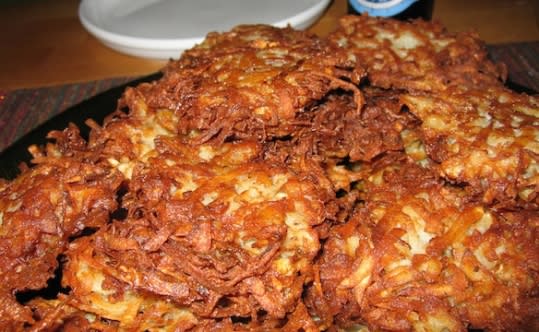
My mother a”h used to fry everything. Potatoes, meatballs, chicken, veal—you name it! If it could be batter dipped, even better! Even today, when I smell fried foods my mouth begins to water. As an adult who is somewhat health conscious, I generally do not eat fried foods. Don’t get me wrong: fried foods are my comfort foods and I do occasionally indulge, just not as often as I did growing up.
Chanukah is traditionally a holiday where most of the foods we eat are fried. There is a deep connection between olive oil and Chanukah. An eight-day holiday, Chanukah commemorates the Jewish people’s successful rebellion against the Greeks in the Maccabean War of 162 BCE. Upon returning to the Temple, only a small bottle of oil was left, only enough to light the menorah for a single day. A miracle occurred and the oil lasted for eight days. This is the reason Chanukah is known as the Festival of Lights.
Back to fried foods! A typical Chanukah menu sounds like it was planned by my mother. Potato latkes, fried, of course, in lots of oil; strawberry-jam-filled doughnuts (sufganiyot), also fried, covered in powdered sugar; fried apple fritters; and cheese-filled doughnuts fried in oil and dipped in honey. Lately, many other fillings have become popular such as caramel, chocolate and custard—none particularly healthy. All of these foods are meant to remind us of certain miracles associated with the events of Chanukah. For me, they bring me back to my childhood as I find myself once again in deep-fried heaven.
I recently searched for healthier recipe alternatives for Chanukah. Unfortunately, they just don’t measure up to what I’m accustomed to. Yes, I know, fried foods are not good for my health or my waistline, but can’t I indulge once a year and relive my childhood of artery clogging, cholesterol-laden, heavenly comfort food fried in oil? I’ve tried all the recipes for healthier alternatives, like low-fat cauliflower carrot latkes and baked doughnuts. They look simply scrumptious, but my “craving monster” wants what it wants! The smell of anything fried is firmly rooted in my psyche. It’s my go-to food when I’m having a bad day, sort of like a tranquilizer or a mood-lifter. For me, the choice of what to put in my mouth is a never-ending emotional game.
There is a non-kosher restaurant in Brooklyn famous for being willing to deep-fry anything you want. Opened by a British couple that wanted to introduce native New Yorkers to their English batter, they made a name for themselves by promising to deep-fry anything a customer might want. The deep-frying madness began in 2001 when they deep-fried a Mars bar. It was so delicious, they started testing other foods and adding them to their menu. Their new deep-fried dishes were a success and soon people started bringing all kinds of foods they wanted to have deep-fried. Imagine deep-frying macaroni and cheese or Oreo cookies! It may sound unappetizing, but it’s actually delicious. The owners warn their customers not to eat this kind of food too often, as it might actually kill them.
The question remains: can I make this a fun-filled Chanukah—a time to share the warmth of the holiday with my children and grandchildren—yet still maintain a healthy diet? In the past, my plan has been to try and manage the temptations. I’ve tried telling myself that I will bring fruit, vegetables and a salad, but secretly they are just the appetizers for latkes.
Who am I fooling? I’m going to indulge and enjoy myself. Even if I do eat too many latkes, I will worry about it after Chanukah, when I will resume my healthy lifestyle. So when you’re indulging in those mouthwatering doughnuts, and the smell of fried latkes permeates the room, don’t lose confidence. If you slip, be grateful for every delicious bite, and remember that our holiday dishes have been passed down through the generations as a tribute to our heritage and our ancestors.
Wishing all of you, a very happy joyful Chanukah.
The words of this author reflect his/her own opinions and do not necessarily represent the official position of the Orthodox Union.
